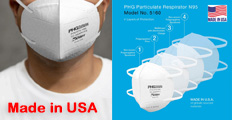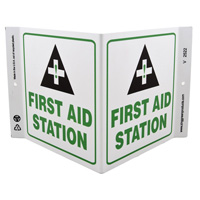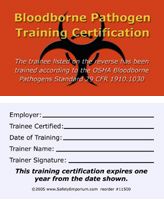



Find all of your laboratory and workplace safety supplies at Safety Emporium!
 Electrolyte |
 Glossary Index |
 Emetic |
| MSDS Topics |
Free Sites | FAQ's | Regulations | Glossary | Software | Suppliers |
| Books | Forum | Poll | Fun stuff | Quiz | Store | |
| Understand your MSDS with the MS-Demystifier | Search ALL our MSDS info | |||||

Seconds count in an emergency. Get your safety wall signs at Safety Emporium.
An embolism is a total or partial blockage of a blood vessel that impedes or stops blood flow. The blockage can be caused by a blood clot, bacteria, air, parasites, bone marrow (from breakage of a major bone) or other bodily or foreign materials.
Embolisms can be life-threatening conditions. For example, if a blood clot travels to the heart and blocks blood flow in the vessels supplying the heart muscles, the result could be a fatal heart attack. If this happens in the brain, the result could be a stroke (also called a "brain attack").
A pulmonary embolism is an embolism that occurs in the lung. These are not uncommon in a condition called deep vein thrombosis (DVT) in which blood clots that form in the vessels of the groin or leg break free and travel to the lungs. If left untreated (with blood thinning medications such as coumarin, for example), a pulmonary embolism can be fatal.
A thrombosis is a blood clot inside a blood vessel. If it breaks free and creates an obstruction it is then called an embolism.
While symptoms of embolisms are often not noted by the victim, certain risk factors for pulmonary embolism are:
Embolisms can form due to trauma (damage) to the body. For example, a bullet, bone marrow or amniotic fluid could work its way into a blood vessel during an accident and cause an embolism.

Get your bloodborne pathogen safety materials from Safety Emporium.
This term is not commonly found on Safety Data Sheets, although we have seen a few SDS's, such as those for estrogens or estrogen mimics, that warn of embolisms as possible health hazards.
See also: Respiratory system.
Additional definitions from Google and OneLook.
Entry last updated: Sunday, July 24, 2022. This page is copyright 2000-2025 by ILPI. Unauthorized duplication or posting on other web sites is expressly prohibited. Send suggestions, comments, and new entry desires (include the URL if applicable) to us by email.
Disclaimer: The information contained herein is believed to be true and accurate, however ILPI makes no guarantees concerning the veracity of any statement. Use of any information on this page is at the reader's own risk. ILPI strongly encourages the reader to consult the appropriate local, state and federal agencies concerning the matters discussed herein.